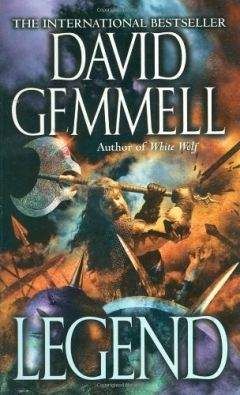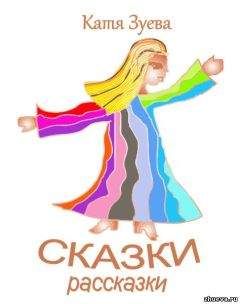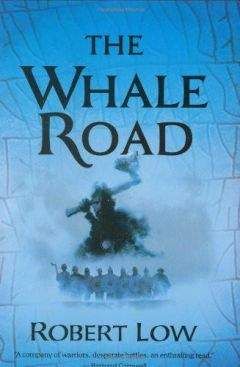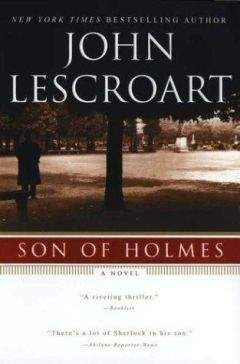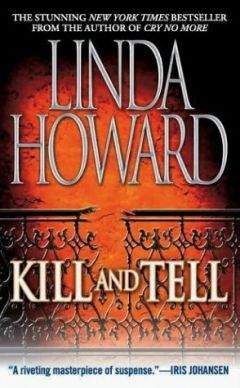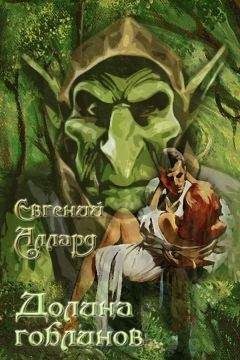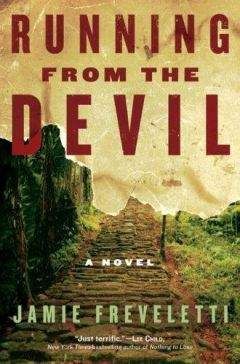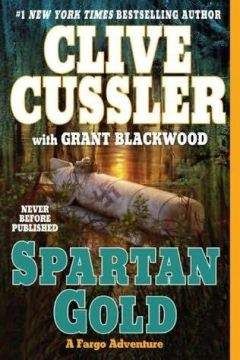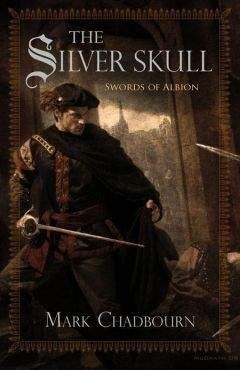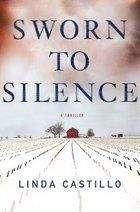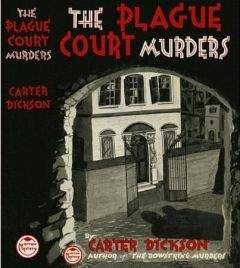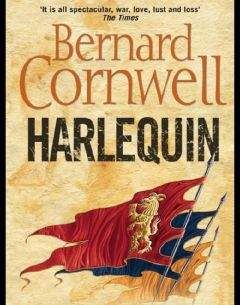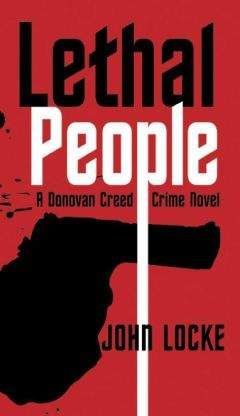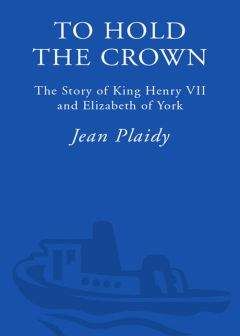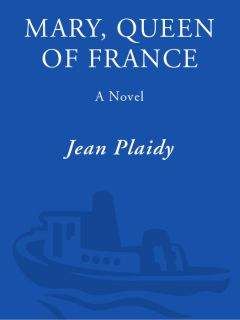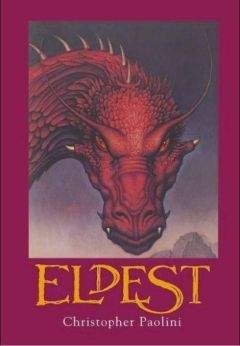Bernard Cornwell - Stonehenge
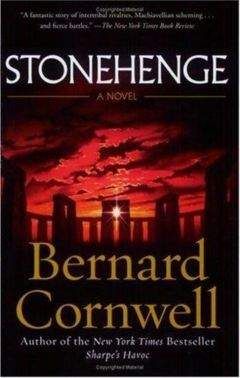
Все авторские права соблюдены. Напишите нам, если Вы не согласны.
Описание книги "Stonehenge"
Описание и краткое содержание "Stonehenge" читать бесплатно онлайн.
The stranger's priest howled at the sky and their leader tried a last appeal, but Hengall would not listen. He had rejected the exchange and the Outfolk had no choice but to pick up their gifts and return to their horses.
But that evening, when the sun was tangled among the western trees like a fish caught in a woven-willow trap, Lengar and a dozen of his closest supporters left Ratharryn. They carried bows and spears and had their hounds leashed on long leather ropes, and they claimed they were going back to their hunting grounds. But it was noted that Lengar also took an Outfolk slave, a woman, and that shocked the tribe for women were not taken on hunting expeditions. And that night a half-dozen more young women slipped out of Ratharryn, so next morning the horrified tribe realized that Lengar had not gone hunting at all, but had fled, and that the women had followed their warrior lovers. Hengall's anger overflowed like the river flooding with storm water. He raged at the malign fate that had sent him such an elder son, then he sent warriors on Lengar's trail, though none expected to catch up with the fugitives who had too long a start. Then Hengall heard that Jegar, who was reckoned Lengar's closest friend, was still in Ratharryn and the chief summoned Jegar to his hut door and there ordered him to abase himself.
Jegar lay flat on the ground while Hengall raised his war club over the young man's head. 'Where has my son gone?' he demanded coldly.
'To Sarmennyn,' Jegar answered, 'to the Outfolk.'
'You knew they planned this,' Hengall asked, his rage mounting again, 'and did not tell me?'
'Your son put a curse on my life if I betrayed him,' Jegar said.
Hengall kept the club poised. 'And why did you not go with him? Are you not his soul's friend?'
'I did not go,' Jegar answered humbly, 'because you are my chief and this is my home and I would not live in a far country beside the sea.'
Hengall hesitated. He plainly wanted to slam the club down and spatter the earth with blood, but he was a fair man and he controlled his anger and so lowered the weapon. Jegar had answered his questions well and though Hengall had no liking for the young man, he still raised him to his feet, embraced him, and gave him a small bronze knife as a reward for his loyalty.
But Lengar had gone to the Outfolk. So Hengall burned his son's hut and pounded his pots to dust. He killed Lengar's mother, who had been his own first wife, and he ordered Gilan to use the Kill-Child on a boy who was popularly supposed to be Lengar's son. The child's mother screamed, begging for mercy, but the aurochs' bone swung and the boy died. 'He never lived,' Hengall decreed of Lengar. 'He is no more.'
Next day was the eve of midsummer and the tribe would walk to Cathallo. To make peace. And to face Sannas.
—«»—«»—«»—
At the dawn of the day on which the tribe was to walk north, Saban's father brought him a deerskin tunic, a necklace of boar's teeth and a wooden-handled, flint-bladed knife to wear in the belt. 'You are my son,' Hengall told him, 'my only son. So you must look like a chief's son. Tie your hair back. Stand straight!' He nodded curtly to Saban's mother, his third wife, whom he had long since ceased to summon to his hut, then went to examine the white sacrificial heifer that would be goaded to Cathallo. Even Camaban went to Cathallo. Hengall had not wanted him to go, but Gilan insisted Sannas wanted to see Camaban for herself. So Galeth had fetched the crippled boy from his lair in the Old Temple, and now Camaban limped a few paces behind Saban, Galeth and Galeth's pregnant woman, Lidda. They walked north along the hills above the river valley and it took a whole morning to reach the edge of that high land which meant they were now halfway to Cathallo. For most of the people who stood on the crest and gazed at the woods and marshes ahead, that was the greatest distance they had ever walked from home.
Their path now dropped steeply into thick woods dotted with small fields. This was Maden's land, a place of rich soil, tall trees and wide bogs.
The men of Hengall's tribe moved close to their women as they entered the trees and small boys were given bundles of straw bound tight to sticks, and the straw was set alight from smouldering coals carried in perforated clay pots. The boys then raced up and down the path, waving their smoky clubs and shrieking to drive away the malevolent spirits who might otherwise come and impregnate the women. The priests chanted, the women clutched talismans, and the men beat their spear staves against the tree trunks. Even more chants were needed to propitiate the spirits as the tribe crossed a tangle of small streams close to Maden.
Hengall walked at the head of his tribe, but he waited on the bank of one of the bigger streams for Saban to catch up. 'We must talk,' he told his son, then glanced at Camaban who limped just a few steps behind. The boy had found another rotting sheep's pelt to replace his old tunic, and carried a crude leather bag in which his few belongings, his bones and snakeskin and charms, were stored. He stank, and his hair was once again tangled and dirty. He looked up at his father, gave a shudder, then spat onto the path.
Hengall turned disgustedly away and paced ahead with Saban. After a while he asked Saban if he had noticed how plump Maden's wheat looked? It seemed the storm had spared those fields, Hengall said enviously, then commented that there had been some fine fat pigs in the woods by the river. Pigs and wheat, he said, were all folk needed for life, and for that he thanked the gods. 'Maybe only pigs,' he mused, 'maybe that's all we need to eat. Pigs and fish. The wheat's just a nuisance. It won't seed itself, that's the trouble.' Hengall was carrying a leather bag that clinked as he walked and Saban guessed it contained some of the tribe's treasures. The people far ahead had started singing and the song grew louder as folk caught up the tune. It passed to the walkers behind, but neither Hengall nor Saban joined in. 'In a few years,' Hengall said abruptly, 'you'll be old enough to become chief.'
'If the priests and the people agree,' Saban said cautiously.
'The priests just need bribes,' Hengall said, 'and the people do as they're told.' A pigeon clattered through the leaves and Hengall looked up to see in what direction the bird flew, hoping that it would be a good omen. It was, for the bird made towards the sun.
'Sannas will want to see you,' Hengall said ominously. 'Kneel to her and bow your head. I know she's a woman, but treat her like a chief.' He frowned. 'She's a hard woman, hard and cruel, but she has powers. The gods love her, or else they fear her.' He shook his shaggy head in amazement. 'She was already old when I was a boy!'
Saban felt fear at the prospect of meeting Sannas. 'Why will she want to see me?'
'Because you're to marry a Cathallo girl,' Hengall said flatly, 'and Sannas will choose her. There's no decision made in Cathallo without Sannas. They call Kital chief, but he sucks on the old woman's tits. They all do.'
Saban said nothing. He knew he could not marry anyone until he had passed the ordeals of manhood, but he liked the idea.
'So you're to take a bride from Cathallo,' Hengall said, 'as a sign that our tribes are at peace. You understand that?'
'Yes, father.'
'But Cathallo doesn't know you're my only son now,' Hengall said, 'and they won't be happy that you're still a boy. That's why you must impress Sannas.'
'Yes, father,' Saban said again. He understood now that Kital and Sannas were expecting Lengar to come to Cathallo and claim a bride, but Lengar was gone and so he must take his place.
'And you will be chief,' Hengall said heavily, 'and that means you have to be a leader of our people. But being chief doesn't mean you can do what you want. Folk don't realize that. They want heroes, but heroes get their people killed. The best chiefs know that. They know they can't turn night into day. I can only do what's possible, nothing more. I can break down beaver's dams to stop the fish-traps drying out, but I can't order the river to do it for me.'
'I understand,' Saban said.
'And we can't have war,' Hengall said forcibly. 'I'm not worried that we'd lose, but that we'd be weakened whether we won or lost. You understand that?'
'Yes,' Saban.
'Not that I mean to die yet!' Hengall went on. 'I must be close to thirty-five summers. Think of that, thirty-five! But I've plenty of good years left! My father lived more than fifty years.'
'So will you, I hope,' Saban said clumsily.
'But you must prepare yourself,' Hengall said. 'Pass your ordeals, go hunting, take some Outfolk heads. Show the tribe the gods favour you.' He nodded abruptly and, without another word, turned and signalled for his friend Valan to join him.
Saban waited for Galeth to catch up. 'What did he want?' Galeth asked.
'To tell me I'm to marry a girl from Cathallo,' Saban said.
Galeth smiled. 'And so you should.' Galeth knew the decision meant that Saban was favoured to become the next chief, but Galeth bore no grudge for that. The big man was happiest when he was working with wood, and had no great desire to succeed his elder brother. He cuffed Saban lightly across the head. 'I just hope the girl's pretty.'
'Of course she will be,' Saban said, though he was suddenly afraid that she might not be.
The tribe crossed the last of the marshes, then climbed into hills that were thick with trees, though the woods gradually thinned to reveal the splendours of Cathallo. They passed an ancient shrine, its timber posts rotting and its circle as overgrown with hazels as Ratharryn's Old Temple, then saw grave mounds on the hill slopes ahead. Those hills were as low as the slopes about Ratharryn, but were steeper, and among them was the famous sacred mound. There was nothing like it in Ratharryn, and though some of the tribe's travellers had brought back stories of other sacred mounds, all agreed that none was the size of Cathallo's. It was vast, a hill fit to stand among other hills, but this hill had been made by man; it reached from a valley to touch the sky and it was all gleaming white for it had been made by heaping chalk on top of more chalk. It was taller, far taller than Ratharryn's embankment; as tall, indeed, as the surrounding hills.
'Why did they make it?' Lidda asked Galeth.
'It's Lahanna's image,' Galeth said, his voice touched with awe and explained that the moon goddess, staring down from the stars, could see herself remade upon the earth and would know that Cathallo revered her. Lidda, hearing the explanation, touched her forehead in obeisance to the goddess for she, like most women, revered Lahanna above all the gods and spirits, but Camaban, who was still limping close behind, suddenly laughed. 'What's funny?' Galeth asked.
'They have giant moles in C-C-Cathallo,' Camaban said.
Lidda touched her groin. She was uncomfortable being so close to the cripple, fearing for the child in her belly, and she wished Camaban would fall behind, but he had stubbornly stayed close all day and still dogged her steps as they splashed through a small river and climbed a hill to the east of the mound. The hill was crowned by a temple that came as a relief to many of Hengall's people for it was much smaller than any of the temples at Ratharryn, though it did have stone markers in place of timber poles. The low stones were rough-hewn, mere stumps of rock, and some folk reckoned they were ugly compared to a properly trimmed pole. A group of Cathallo's priests waited at the temple, and it was to them that the first of Ratharryn's gifts was given: the white heifer that had been goaded bloody on the long journey and was now driven through the gap in the temple ditch. Cathallo's priests examined the beast warily. It was not, perhaps, the whitest heifer in Ratharryn, but she was still a good animal with a nearly unblemished hide and there were murmurs of resentment among Hengall's people as the priests appeared to doubt the beast's quality. At last, after prodding and smelling the animal, they grudgingly deemed her acceptable and dragged her to the centre of their small temple where a young priest, naked but for a pair of antlers tied onto his head, waited with a pole-axe. The heifer, seeming to understand what was about to happen, strained to escape the men holding her, so the priests cut the tendons of her legs and the immobilized beast bellowed mournfully as the great axe swung.
Hengall's folk sang Lahanna's lament as they filed through the heifer's wet blood and followed the priests along a path of paired stones. The temple might have failed to impress them, but the avenue of stones did not, for these stones were larger than the temple markers and they led far across the open country. The boulder-edged avenue dipped from the temple to the valley, but swerved before it reached the great chalk mound to stride north towards the crest of a wide down. There were so many stones flanking the sacred track that they could not be counted, and all were as tall or even taller than a man. Some were pillars, symbolizing Slaol, and each pillar was paired with a vast lozenge-shaped slab that honoured Lahanna. Cathallo's wonders really were true, and Hengall's people fell silent as they followed the priests north. They danced as they climbed, clumsily for they were tired, but dutifully shuffling from one side of the avenue to the other, zigzagging their way up to the crest where some folk from Cathallo had assembled to see the visitors. One group of warriors, their bodies greased and hair plaited, leaned on their spears to watch the women pass, though the sight of Camaban prompted the young men to cover their eyes and spit in case his clubbed foot brought them evil.
Saban, who had never visited Cathallo before, had assumed that the massive paired stones lined a path that led from Cathallo's settlement to the small stone temple where the heifer had been sacrificed, but as he crossed the crest of the down he suddenly realized that the small temple, far from being the end of the sacred path, was merely its beginning, and that the true wonders of Cathallo still lay ahead.
The settlement, unwalled, lay to the west, and that was not where the path went. Rather it led towards a great chalk embankment that reared up from the low ground. Word passed down the column of travellers that the white embankment surrounded Cathallo's shrine and Hengall's folk fell silent as they marvelled at the vast wall which looked to be as high and as extensive as the embankment which surrounded Ratharryn. The wall's long summit was crowned with animal and human skulls, while from within the great enclosure came the heavy beat of wooden drums.
The path did not lead direct to the vast temple, but instead, just outside the shrine's entrance, made a double turn so that the wonders within the high chalk circle would not be revealed until the very last moment of the approach. Saban shuffled his dance steps about the double bend and there, suddenly visible beyond the shoulders of the great encircling bank, was Cathallo's shrine. Saban's first impression was of stones. Stones and more stones, for the great space within the soaring chalk wall seemed filled with heavy, high, grey boulders, and some had been newly wetted so that glints of light shone from their rough surfaces. The giant stones lay ringed by a ditch that had been dug inside the chalk wall, and the ditch was as deep as the rampart was high, and the area enclosed by the ditch and wall was almost as large as Ratharryn itself and Ratharryn was a tribe's settlement with winter room for cattle, while this was just one temple.
Подписывайтесь на наши страницы в социальных сетях.
Будьте в курсе последних книжных новинок, комментируйте, обсуждайте. Мы ждём Вас!
Похожие книги на "Stonehenge"
Книги похожие на "Stonehenge" читать онлайн или скачать бесплатно полные версии.
Мы рекомендуем Вам зарегистрироваться либо войти на сайт под своим именем.
Отзывы о "Bernard Cornwell - Stonehenge"
Отзывы читателей о книге "Stonehenge", комментарии и мнения людей о произведении.






